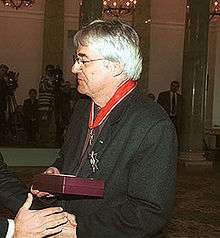Andrzej Żuławski
| Andrzej Żuławski | |
|---|---|
 Andrzej Żuławski in 2001 | |
| Born |
22 November 1940 Lwów, Poland |
| Occupation | Film director |
| Years active | 1971–present |
| Children | 3 |
| Website |
andrzej-zulawski |
Andrzej Żuławski (Polish: [ˈandʐɛj ʐuˈwafskʲi]; born 22 November 1940)[1] is a Polish film director and writer. He was born in Lwów, Poland, now Ukraine. Żuławski has often gone against mainstream commercialism in his films, and has enjoyed success mostly with European art-house audiences.
In the late 1950s, he studied cinema in France. His second feature The Devil (1972) was banned in Poland, and Żuławski went to France. After the success of That Most Important Thing: Love in 1975, he returned to Poland where he spent two years making The Silver Globe (1988). The work on this film was interrupted by the Polish authorities. After that, Żuławski moved to France where he became known for controversial and violent art-house films. Żuławski is also known for his work with certain specific actresses including Romy Schneider, Isabelle Adjani and Sophie Marceau.
His films have received 16 awards at various international film festivals. Żuławski has also written several novels, for example: Il était Un Verger, Lity Bór (a.k.a. La Forêt Forteresse), W Oczach Tygrysa, and Ogród Miłości.
Career
Żuławski was an assistant of Andrzej Wajda.[2] When his second film Diabeł was banned in Poland[3] he decided to move to France, where he made L'Important c'est d'aimer (1975) with Romy Schneider.[4]
After returning to Poland he worked for two years on a film which the authorities did not allow him to finish (On the Silver Globe), based on a book by his great-uncle Jerzy Żuławski.[1] Since then he has lived and worked mostly in France, making art films.
Being a maverick who always defied mainstream commercialism, Żuławski enjoyed success mostly with the European art-house audiences. His wild, imaginative, and controversial pictures have received 16 awards at various international film festivals. He also wrote the novels Il était Un Verger, Lity Bór (a.k.a. La Forêt Forteresse), W Oczach Tygrysa, and Ogród Miłości.[1]
He was in a relationship for sixteen years with the French actress Sophie Marceau, with whom he made four films over a 15-year period (L'Amour braque, Mes nuits sont plus belles que vos jours, La Note bleue, La Fidelité). They had a son Vincent together. They broke up in 2001.[3]
In 2006 he was the Head of the Jury at the 28th Moscow International Film Festival.[5]
On the Silver Globe
Andrzej Żuławski had always wanted to film his granduncle's masterwork and saw the offer as a unique opportunity to achieve that aim. Żuławski devoted over two years to the task of adapting the first two volumes to the screen. Between 1975 and 1977, he wrote the screenplay and lensed the film on various locations around Poland, as well as Crimea, the Caucasus Mountains and even the Gobi Desert.
In spring 1977, however, the project came to a sudden halt with the appointment of the hardline ideologue Janusz Wilhelmi as the Vice-Minister of Culture. Perceiving the Selenites' battle against the Szerns as a thinly-veiled allegory of the Polish people's struggle with totalitarianism, Wilhelmi shut down the filming, which was 80% complete and ordered all materials destroyed.
Żuławski went back to France to find that the reels of unfinished film were preserved, along with costumes and props, by the Polish film studio and archives and by members of the film's cast and crew. A passage of another eight years was required, as glasnost and perestroika began to thaw the Cold War-dominated Eastern Europe, for Żuławski to be able to return again to Poland and edit the still-unfinished remnants into a 166-minute rough approximation of what the finished film might have been. On the Silver Globe premiered at the Cannes Film Festival in May 1988, with some critics proclaiming it a ruined masterpiece.
Filmography (selected)
- The Third Part of the Night (1971)
- The Devil (1972)
- That Most Important Thing: Love (1975)
- Possession (1981)
- The Public Woman (1984)
- Mad Love (1985)
- Maladie d'amour (1987), writer
- On the Silver Globe (1988) [partially lost film]
- My Nights Are More Beautiful Than Your Days (1989)
- Boris Godunov (1989)
- The Blue Note (1991)
- Szamanka (1996)
- Fidelity (2000)[1]
- Cosmos (2015)
References
- 1 2 3 4 Culture.pl
- ↑ Mira Liehm; Antonín J. Liehm (1980). The Most Important Art Soviet and Eastern European Film After 1945. University of California Press. p. 378. ISBN 978-0-520-04128-8.
- 1 2 Atkinson, Michael (2008). Exile Cinema Filmmakers at Work beyond Hollywood. SUNY Press. p. 79. ISBN 978-0-7914-7861-5.
- ↑ María Luisa Amador; Jorge Ayala Blanco (2006). Cartelera cinematográfica, 1980–1989. UNAM. p. 425. ISBN 978-970-32-3605-3.
- ↑ "28th Moscow International Film Festival (2006)". MIFF. Retrieved 2013-04-14.
External links
- Andrzej Żuławski at the Internet Movie Database
- Andrzej Żuławski atCulture.pl
Jerome d'Estais, Andrzej Zulawski, sur le fil, LettMotif, ISBN 978-2-36716-143-3
ISBN 978-2-36716-144-0
| ||||||
| ||||||
|